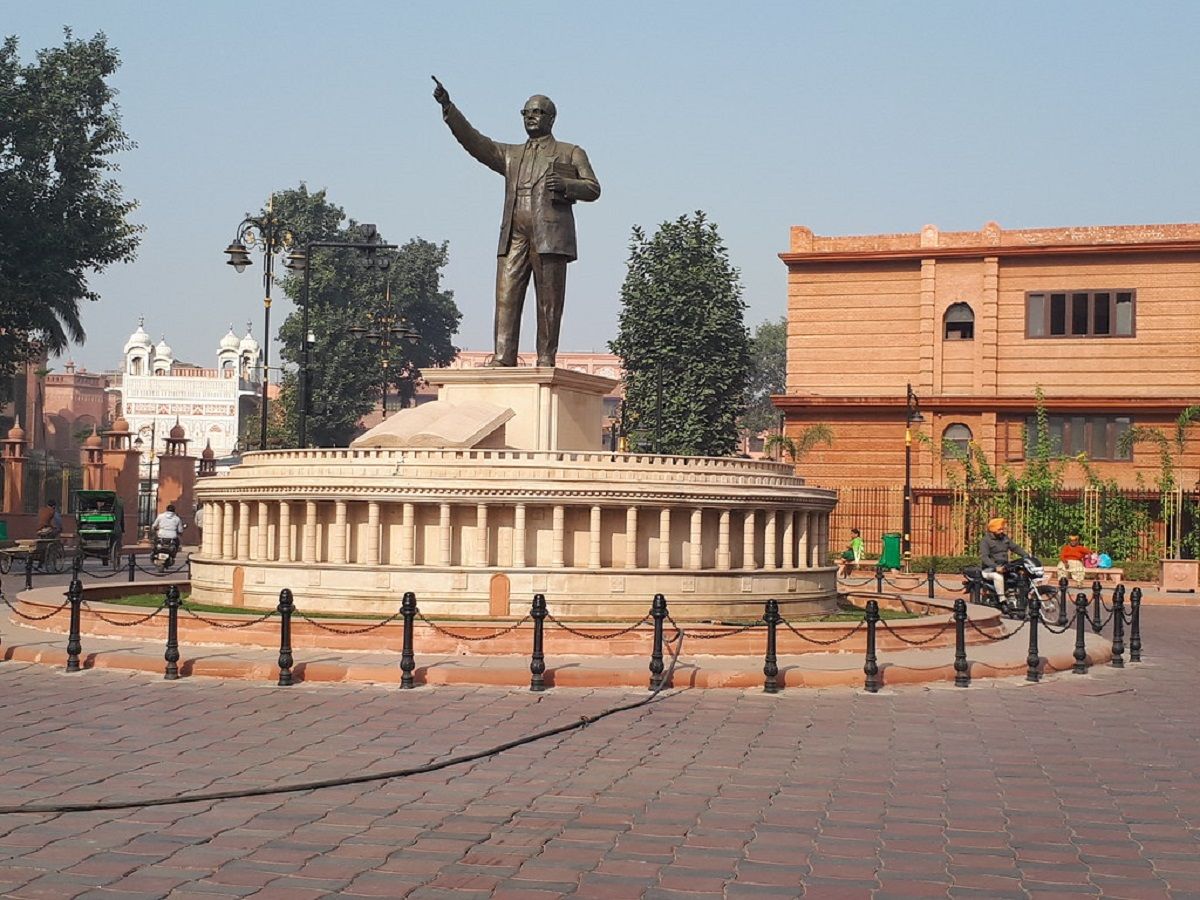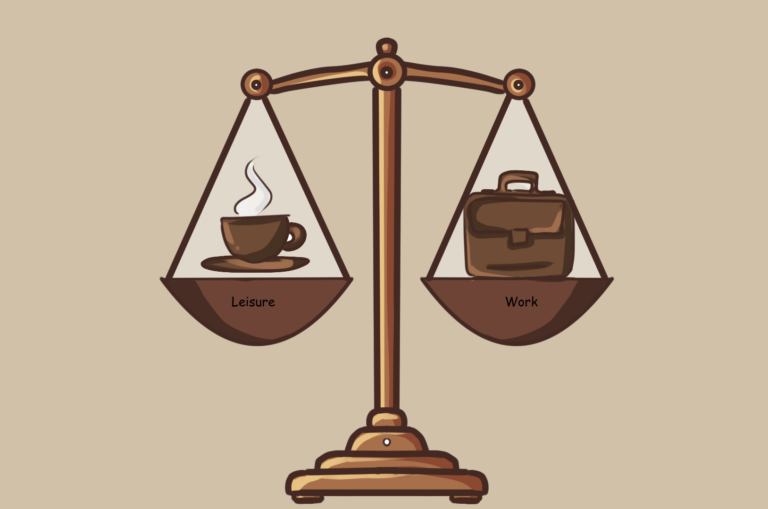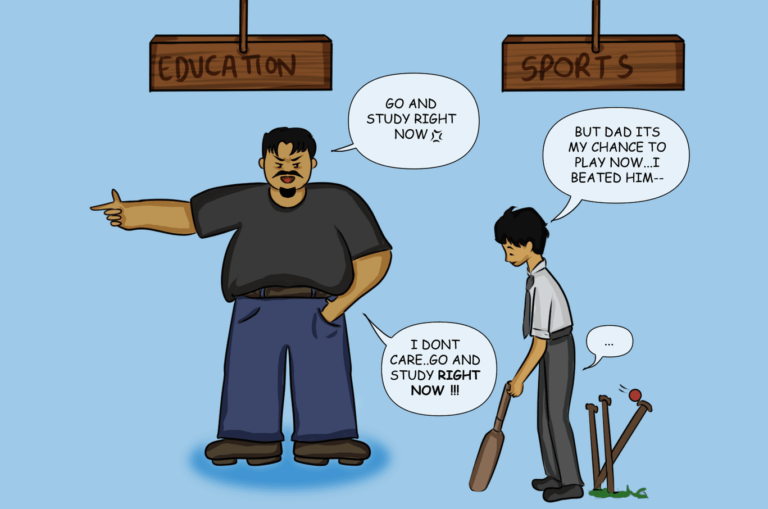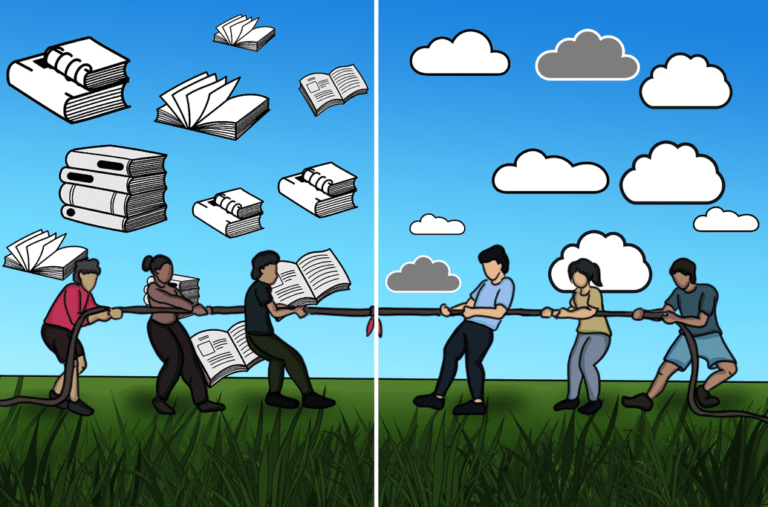Constitutional morality as a service to the republic

Avinash is in civil service. Views are personal.
[responsivevoice_button voice=”Hindi Male” buttontext=”Let’s listen to this Theel”]
On the twenty-sixth day of January in 1950, India, that is Bharat, became a republic. It was on this day, we, the people of India, adopted our constitution. At that time, the world laughed at us for adopting the path of democratic-republic as a way forward for our country. After 69 years, not only the doomsayers are no more; we stand as a vibrant democracy. The Constitution of India has always acted as an ensemble to guide and transform India into a modern republic. Republic Day, every year, is a moment of pride, great joy, and fervor.
Our Republic Day reminds us of the pledge the founding fathers took for the then-infant nation. It was the pledge to promote constitutionalism in India and inculcate constitutional morality among the public functionaries and the citizens alike. Dr. Bhimrao Ramji Ambedkar, argued in Constituent Assembly, that democracy in India is a “top-dressing” and the people are yet to learn about the constitutional morality.
The emphasis of constitutional morality is on civility. It calls for tolerance, restraint, and mutual accommodation in public life. For Edward Shils, it “restrains the exercise of power by the powerful and restrains obstruction and violence by those who do not have power but who wish to have it.” The core element of constitutional morality is respecting the dignity of every individual, even if there exist serious differences, as diversity is another essential element of it.
Constitutional morality
Constitutional morality is a central feature of constitutionalism. Thus, the pledge was to promote constitutionalism by making people adopt constitutional morality as the way of life in the modern, democratic republic of India. “Dignity, liberty, and equality are cornerstones of Constitutionalism,” notes Susanne Baer. Baer, argues further, that ‘human dignity’ forms the “bedrock” of legal order and must be cultivated to “construct a constitutional order.” Gautam Bhatia explains that a revolutionary feature in the Fundamental Rights chapter of the Indian Constitution, which is relatively unnoticed, is the golden triangle of the articles 15(2), 17 and 23. They give protection to individuals, not only against the State, but also against other individuals and communities. Thus, for Bhatia, it is the task of constitutionalism to “positively guarantee freedom” by respecting individual dignity, allowing for fraternity within the society. It can be summed up that mutual respect is the fulcrum of fraternity that assures dignity.
The adoption of the constitution with a pledge to promote constitutionalism in India brought forth the concept of constitutional morality. The Supreme Court of India, over the years, interpreted and emphasized individual dignity as the core feature of constitutional morality and, thus, of the Constitution of India. Lately, there has been a flurry of judgment by the Supreme Court of India, where the principle of “Constitutional Morality” has been invoked and highlighted to deliver justice. In the NCT of Delhi (2017) case, Puttaswamy (2017) case, Navtej Singh Johar (2018) case, and the Aadhar (2018) case, the Supreme Court has utilized the principle of “Constitutional Morality” to assure the dignity, life, liberty, and identity of individuals. It can be illustrated by the fact that the word dignity got mention 128 times in the Puttaswamy case and 120 times in the Navtej Singh Johar case. Thus, to assess the spread of Constitutionalism in India, this article analyses the spread of constitutional morality through its core element, which is respect for the individual (human) dignity.
“Dignity can be defined as non-humiliation and non-infantilization”, says Josiah Ober. Ober argues that individual dignity is a social value, and it is a democracy that distributes civic pride and human dignity. The politics of casteism and communalism, the common methods of exclusion, stark economic disparities, and the individual act of hatred and dominance breach individual dignity in ways more than one. It reflects that the project to inculcate constitutional morality in our daily life of (modern) being is still a work in progress.
Dipankar Gupta provided an interesting and insightful theoretical framework for modernity. One component of the framework for modernity is respecting the “dignity of the individual”. Any individual or society, within this framework, will not be deemed to be modern if it violates individual dignity. Thus, utilizing the concept of personal dignity, this article will analyze not only the spread of constitutional morality but also the spread of modernity in India.
It is clear from the secondary sources and the common-sense knowledge that from the conditions of acute poverty to disproportionate wealth inequality, from militant violence to road rage, from degrading political communication to steep decline in social harmony, from professional conduct to personal act, at each step, we fracture the individual dignity through different agents. To quickly assess the contemporary state of the spread of constitutional morality, we have done a quick survey.
A reality check
The survey was done in November 2018 through the method of the questionnaire. The sample space was a University in the region of Delhi-NCR. The sample elements, approximately a hundred, were graduates, representing the top four percent of all educated people in India, were selected randomly from within the campus of that University. These sample elements depict the “demographic dividend” of India. They are the individuals who have enjoyed the social, economic, and political benefits of the democratic-republic. It is thus crucial to analyze the spread, or the lack thereof, constitutional morality among these participants. The survey was done to analyze if the respondents respect the dignity of other individuals and also their dignity under varied circumstances.
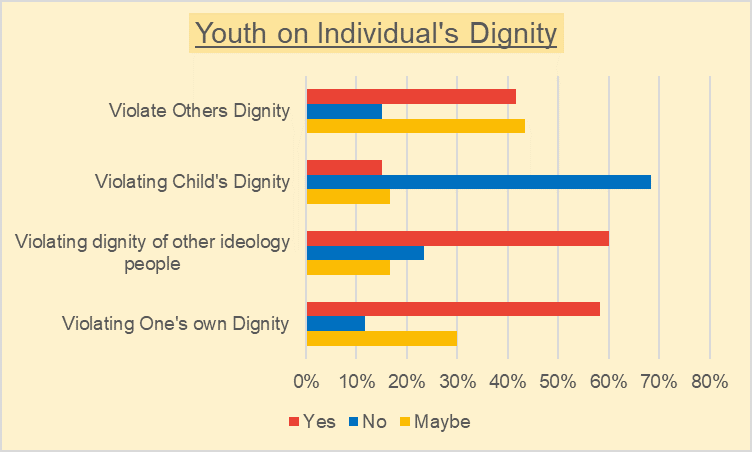
The result of the survey was striking. 85% of respondents accepted that they might violate the dignity of others in personal communication. 88% of respondents admitted that they might violate their dignity under certain situations; 40% of respondents accepted that they might not grant dignity to individuals of opposite ideologies; and 32% respondents agreed that they might disregard the dignity of a child, though for the good of the child only. It is essential to highlight that the survey respondents were small and non-representative. Nevertheless, these numbers can be assumed to reflect the miserable state of the spread of “Constitutional Morality,” and thus “Constitutionalism,” in India, as the respondents were a niche audience gaining the fruits of the right to development, right to dignity and the constitutional democracy in India.
In a true democracy, the citizens are mutually responsible for the establishment, maintenance, and continuance of everyone’s dignity. Thus, it is highly imperative that the vision of the founding fathers establish a constitutional democracy in India to be fulfilled. The highly emphasized goal of constitutional morality is worked upon. The youth in India are innovative, creative, hard-working, and capable of leading the nation in the forward direction. However, from the primary and secondary data and common-sense knowledge, it is observed that the young citizens of India not only lack constitutional morality but is also distant from modernity. It is reflected in their violation of the dignity of others at multiple junctures. It leads to the inhibition of fraternity and democracy in India. Respect for individual/human dignity is the first step to achieve the goal of constitutionalism and modernity.
It can be summarised that efforts must be taken to make sure that constitutional morality is nurtured by every Indian citizen. Article 51A(e) of our constitution exhorts every Indian “to promote harmony and the spirit of common brotherhood amongst all the people of India.” We serve our nation in different capacities, but breaching the dignity of an individual, institution, or any structure of the society is the greatest disservice we can do to our nation and our constitution. We have ordained ourselves through our Preamble that we have to promote fraternity among all the citizens by “assuring the dignity of the individual.” We shall remember that ensuring dignity, mutual respect, and empathy are the keywords for the service of the nation.
Featured Image Credits: Flickr


